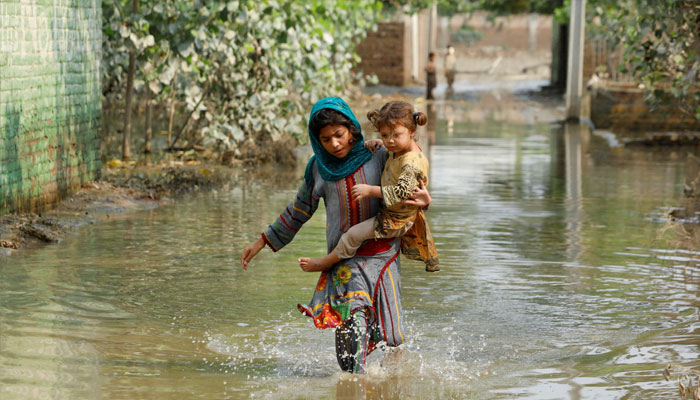Climate challenge
Thankfully, there are signs that the government is placing climate change as top priority
Pakistan has unfortunately been trapped in a situation where it is facing the brunt of action carried out by the developed world. Rich nations are busy polluting the environment, leading to increased global temperatures, and poor countries like ours are left behind to deal with the apocalyptic effects of climate change. The 2022 floods, which left one-third of the country underwater, show how bad the situation could be for Pakistan if it does not take adequate measures timely. Thankfully, there are signs that the government is placing climate change as top priority. In his recent address delivered during the 27th Sustainable Development Conference in Islamabad, Acting President and Senate Chairman Syed Yusuf Raza Gilani highlighted the need for the country to build a climate-resilient food system and protect its agriculture sector from the impacts of global warming. But the well-meaning sessions by authorities fail to deal with the challenge of food insecurity that could hurt the country’s rural populations in the absence of a well-thought-out action plan.
The issue in Pakistan is the lack of consistency. Political polarisation is so deep that successive governments rehash the same old programmes with their names, forcing the country to restart its progress all over again. Second, most projects that the country initiates here are reliant on foreign aid. Most countries prefer extending loans, which allows them to earn through markup accrued on such debt. But Pakistan has been lobbying to get these loans converted into grants so that it can focus on rebuilding instead of worrying about debt repayments. This lobbying has been going on for years now, and so far there has been no progress. Ideally, this should have convinced the government to come up with home-grown solutions, but that’s not the case.
Of course, Pakistan is not alone in this mess. Many developing countries in the Global South are bearing the brunt of unchecked advancements in the developed world. One important point that Pakistan is missing is its collaboration with neighbouring countries that are facing the same challenges. It is good that the Punjab government wants to talk with India to tackle smog. The same approach should be adopted at a federal level so that a home-grown solution could be developed to fight climate change. Pakistan also has to realise that rich nations are not that interested in bailing out smaller countries affected by climate change. In this race of global advancements, each country is on its own. In the upcoming COP29, the country must use the platform to highlight the challenges it faces and convince the world to adopt an environment-friendly development approach that could spare the smaller countries.
-
 Billie Eilish Slammed For Making Political Speech At Grammys
Billie Eilish Slammed For Making Political Speech At Grammys -
 Beverley Callard Announces Her Cancer Diagnosis: 'Quite Nervous'
Beverley Callard Announces Her Cancer Diagnosis: 'Quite Nervous' -
 WhatsApp May Add Instagram Style Close Friends For Status Updates
WhatsApp May Add Instagram Style Close Friends For Status Updates -
 Winter Olympics Officially Open In Milan, Cortina With Historic Dual Cauldron Lighting
Winter Olympics Officially Open In Milan, Cortina With Historic Dual Cauldron Lighting -
 Sciences Reveals Shocking Body Response Against Heart Attack
Sciences Reveals Shocking Body Response Against Heart Attack -
 Who Is Charlie Puth? Inside Awards, Hits & Journey Of Super Bowl Anthem Singer
Who Is Charlie Puth? Inside Awards, Hits & Journey Of Super Bowl Anthem Singer -
 Jared Leto 'swings For The Fences' In 'Master Of The Universe'?
Jared Leto 'swings For The Fences' In 'Master Of The Universe'? -
 Kelsea Ballerini, Chase Stokes Not On Same Page About Third Split: Deets
Kelsea Ballerini, Chase Stokes Not On Same Page About Third Split: Deets -
 Shanghai Fusion ‘Artificial Sun’ Achieves Groundbreaking Results With Plasma Control Record
Shanghai Fusion ‘Artificial Sun’ Achieves Groundbreaking Results With Plasma Control Record -
 Princess Anne Enjoys Andrea Bocelli, Lang Lang Performances At Winter Olympics Opening Ceremony
Princess Anne Enjoys Andrea Bocelli, Lang Lang Performances At Winter Olympics Opening Ceremony -
 Ben Stiller Cherishes Working With Late David Bowie
Ben Stiller Cherishes Working With Late David Bowie -
 Anti-inflammatory Teas To Keep Your Gut Balanced
Anti-inflammatory Teas To Keep Your Gut Balanced -
 Polar Vortex ‘exceptional’ Disruption: Rare Shift Signals Extreme February Winter
Polar Vortex ‘exceptional’ Disruption: Rare Shift Signals Extreme February Winter -
 Which Countries Are Worst And Best In Public Sector AI Race?
Which Countries Are Worst And Best In Public Sector AI Race? -
 Matthew McConaughey Opens Up About His Painful Battle With THIS
Matthew McConaughey Opens Up About His Painful Battle With THIS -
 Emma Stone Reveals She Is ‘too Afraid’ Of Her ‘own Mental Health’
Emma Stone Reveals She Is ‘too Afraid’ Of Her ‘own Mental Health’




